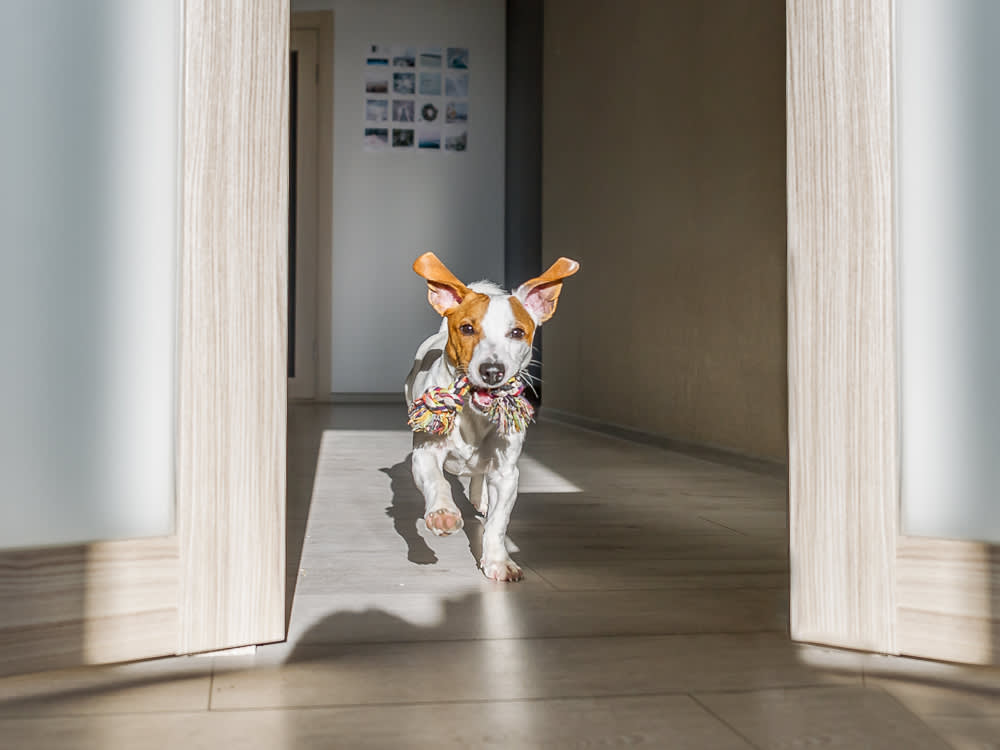6 Things to Know About Dog Zoomies
Not counting how fun they are to watch.

share article

Your pet wants you to read our newsletter. (Then give them a treat.)
Zoomies have been a part of my life far longer than Zoom meetings. I’ve enjoyed watching dogs do the zoomies in the yard or at the park, racing around an open space, as well as inside — leaping over the coffee table and running along the back of the couch. Zoomies are one of the most charming and entertaining of canine behaviors. But why do dogs get zoomies? Below, everything you need to know about dog zoomies.
1. There’s a technical term for the zoomies.
Scientifically speaking, zoomies are frenetic random activity periods, or ‘FRAPS.’ It has been theorized that FRAPsopens in a new tab allow animals to relieve stress, let out stored up energy, and handle excitement and play — but the function of frapping is still unknown.
2. Zoomies involve furious bursts of speed.
Dogs with the zoomies will run in wide circles in a series of laps and may exhibit repetitive spins. They often break into a sprint suddenly; their back end tucked as they go; a wild, excited look in their eyes; and lots of sharp turns, spins, or sudden changes in direction.
3. There are a lot of precursors to the zoomies.
Zoomies can happen when dogs get revved upopens in a new tab or aroused, when they go out after being inside for a while, when they see another dog, when their favorite person comes home, or in the snow. It’s also common following a few other circumstances: a bath, pooping, grooming, and being released from a crate or any other form of restraint.
4. Dog zoomies are normal.
There is nothing wrong with this normal dog behavior — as long as your dog doesn’t run around in a place that is unsafe, such as near a road or through a part of the yard with dangerous objects. Though zoomies are not problematic, sometimes dogs that chase their tails are mistaken for having the zoomies when they’re actually showing symptoms of obsessive-compulsivenessopens in a new tab.
5. Zoomies don’t last long.
Most of the time, a case of the zoomies lasts less than a few minutes. Although they have been known to extend upwards of 10 minutes, that is not typical.
6. It’s difficult to stop dog zoomies, but not impossible.
It’s hard to stop a dog mid-zoom, so it is usually easiest to wait out these short-lived actions. You can redirect their motion by running away from them so they chase you to a safer spot if need be. Or, you can throw a toy in the direction you want a dog to go. The better your dog’s recall, the sooner they will come to you as their zoomies wind down. Whatever you do, don’t chase a dog with the zoomies as that will only add excitement to the moment and make it harder for your dog to calm down.

Karen B. London, PhD, CAAB, CPDT-KA
Karen B. London, Ph.D., is a Certified Applied Animal Behaviorist and Certified Professional Dog Trainer who specializes in working with dogs with serious behavioral issues, including aggression, and has also trained other animals including cats, birds, snakes, and insects. She writes the animal column for the Arizona Daily Sun and is an Adjunct Professor in the Department of Biological Sciences at Northern Arizona University. She is the author of six books about training and behavior, including her most recent, Treat Everyone Like a Dog: How a Dog Trainer’s World View Can Improve Your Lifeopens in a new tab.
Related articles
![black cat doing zoomies on a bed]() opens in a new tab
opens in a new tabYour Cat’s Erratic Zoomies — Explained
Fast, furious, and officially normal — according to a cat behaviorist.
![Owner and black dog running outside against blue backdrop]() opens in a new tab
opens in a new tab5 Running Games to Play With Your Dog
A few minutes — or even a few steps — are all you need to add joy to your dog’s day.
![A woman sitting at a dining room table with a dog.]() opens in a new tab
opens in a new tabHouse Dogge Makes Sustainability Feel Effortlessly Cool
Former Nike Design Director Angela Medlin on applying her streetwear savvy to eco-conscious pet products.
![Barking dog on the leash outdoors. Russian spaniel at a walk misbehaving or being bad tempered]() opens in a new tab
opens in a new tabDoes Your Dog Act Diabolical on a Leash?
Same! Here’s how I got my pup to stop barking and lunging at everything that moves on walks.




